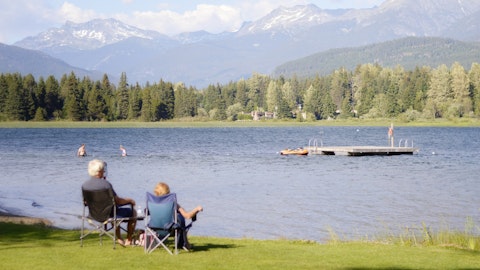Julien Dumoulin-Smith: Yes. All right. Well, guys, and just one quick follow-up here, if I can, since you mentioned, we’re still here in the sort of winter season. Obviously we saw winter dynamics play themselves out in recent weeks across some of your – a good chunk of your service territory. Any considerations about how your system performed and/or commentary about how that positions you? Again, I get that a lot of this is ultimately just servicing your customers here and flow throughs, numerous set of riders across your jurisdictions. But any commentary about the experience in recent weeks, obviously in sharp contrast to some prior years here.
Kevin Akers: Yes, as I said at our opening, very proud of all 5000 Atmos Energy employees. I think we did an exceptional job with this winter storm. The severity that it came in, I think depending on where you want to look at for heating degree day data, it was some 78% colder than normal in some locations, 200% colder than last year. So again, this takes a sustained period of investment in infrastructure improvement across your system. Obviously we did a lot of projects from last year, but we’ve been at this now for over 12 years. Improving our infrastructure, that’s what allows us to be able to serve during these historic periods when they come in. You just can’t do that overnight. I think our team’s done a good job of identifying opportunities throughout the years and executing on those projects, but also very proud of our product.
Look, for that week, I think we set a record across the country at a 174 Bcf of natural gas, with a peak of 72 Bcf for residential and commercial. So again, very proud of natural gas and what it does. And I think if you look at the energy output for that week, according to EIA, natural gas, petroleum and coal consumed 85% of the energy demand for that period. So very proud of what we continue to do as an industry.
Julien Dumoulin-Smith: Excellent. Well, we’ll leave it there. Thank you, sir. Appreciate it.
Kevin Akers: Thank you.
Operator: Your next question comes from the line of Richard Sunderland with JPMorgan. Your line is open.
Richard Sunderland: Hi, good morning and thank you for the time today. I’d like to circle back on the property tax item one more time, if I could, just to be clear on that benefit. Is what you quantified the full amount of the benefit, or is that net of any reserves for return to customers? How are you thinking about that latter portion?
Chris Forsythe: Yes. That number is the benefit relative to our guidance for fiscal 2024. We don’t have I mean, what will happen is for accounting purposes; we recognize the impact in this fiscal year. Over the next couple two and a half years, we’ll return that benefit back to our customers through our various mechanisms here in Texas. So it’s really a temporary timing difference, if you will, but it does impact our financial results for fiscal 2024. And as I mentioned earlier, we’ll have an update on what we think that will impact us for the full fiscal year later this fiscal year – I guess primarily in our next call.
Richard Sunderland: Okay, understood. Very helpful color there. Thank you. And then just turning to the Fort Worth incident, I was curious if you could talk a little bit about the site status. Just seen some media headlines around debris removal. Any current color there would be helpful. Also, who is currently investigating?
Kevin Akers: The site, I believe has been turned over according to the articles that we’re seeing. The information that’s been related to us back to the owners of it, I believe, and they’re in charge of the removal at this point. And obviously you’ve seen our statements out there, our press release that our system has been tested and was not involved.
Richard Sunderland: Great. Thank you very much.
Kevin Akers: Thank you.
Operator: Your next question comes from the line of Nick Campanella with Barclays. Your line is open.
Nick Campanella: Hey everyone, thanks for taking my question and sorry to ask about property taxes, but I just wanted to triple check what’s the negative offset to that $0.09 to $0.11 property tax in the guide for 2024?
Chris Forsythe: Well, right now, Nick, as we talked about a couple of minutes ago, we’re still in the middle of the winter heating season. We need to see how our margins hold up as we move into January, February, March. We still evaluating our O&M needs for the fiscal year. So we felt it was prudent to maintain the guidance in this range at this point and provide a more thorough update once we get through the winter heating season.
Nick Campanella: Hey, I really appreciate that. And then Chris, I know you said in your prepared remarks you’re fully priced for 2024 equity needs. How much is remaining left to do for 2025 before you’ve kind of taken care of that fully?
Chris Forsythe: Yes, we still have ways to go on that for legal reasons, I can’t say precisely how much it’s been priced, but under the terms of the agreements that we have in place. But we will just continue to stay ahead of our equity needs through the ATM throughout this fiscal year in preparation for FY 2025.
Nick Campanella: Got it. And then just one last one for me. I know that the LDC M&A market continues to be active and there’s potentially even processes going around in states that are either adjacent or in your current territories. I’m just – can you just remind everyone what your kind of – your message is around M&A and your philosophy there? Thank you.





